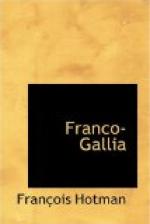Scacaria
summoned in Normandy
at Easter
and at Michaelmas.” Thus far
Budaeus;
to whom agrees what we find in an ancient Book concerning
the
Institution of Parliaments, wherein this
Article is quoted out of the
Constitution of Philip
the 4th, Sirnamed the
Fair [ex Anno 1302.]—“
Moreover,
for the Conveniency of our Subjects, and the expeditious
determining of Causes, we propose to have it enacted,
that two Parliaments shall be held every Year at
Paris,
and two Scacaria
at Rouen:
That the Dies Trecenses
shall be held twice
a Year: and that a Parliament shall be held at
Tholouse,
as it used to be held in past Times,
if the People of the Land consent to it: Also,
because many Causes of great Importance are debated
in our Parliament, between great and notable Personages;
We ordain and appoint, that two Prelates, and two
other sufficient Persons, being Laymen of our Council;
or at least one Prelate and one Laick, shall be continually
present in our Parliaments, to hear and deliberate
concerning the above-mentioned Causes."—From
which Words we may learn, First, how
seldom
the Courts of Judicature heard Causes in those Days.
Next, how few judges sat in those
Parliaments.
For as to the other Provinces and Governments of the
Kingdom, we have (in the same Book) the
Constitution
of Philip the Fair, in these Words, [Anno 1302.]—“
Moreover,
We ordain that our Seneschals and Bayliffs shall hold
their Assizes in Circuit throughout their Counties
and Bayliwicks once every two Months at least."
Furthermore, Budaeus in the same Place, [Anno
1293.] writes, that Philip the Fair
appointed, that three Sorts of People shou’d
sit in Parliament, viz. Prelates, Barons,
and Clerks mixed with Laymen: “Since
the Laicks (says he) are chosen promiscuously out of
the Knights, and out of other Sorts of People.
Also, that the Prelates and Barons shou’d select
fit Persons out of that third Estate, to exercise every
Sort of Judicature; and at the same Time shou’d
chuse three Judges, who shou’d be sent abroad
into those Countries where the written Laws of the
Land had their Course, that they might there judge
and determine according to Law. And if any Question
of great Importance were to be argued, they should
take to their Assistance the most Learned Men they
could get.—” In which Place, Budaeus
lamenting the Evil Customs of our Times; that is,
this Kingdom of Lawyers now in Vogue, breaks
out with Juvenal into this Exclamation:
“Quondam hoc indigenae vivebant more!
So (says he) may I exclaim, that in Old Times,
when this Kingdom flourished, (as many appear by our
Money coined of pure fine Gold) there was a plain
and easy Way of doing Justice; there were few Law-suits,
and those not of long Continuance, or indeed Eternal,
as now they are; for then this Rabble-Rout of pretended




